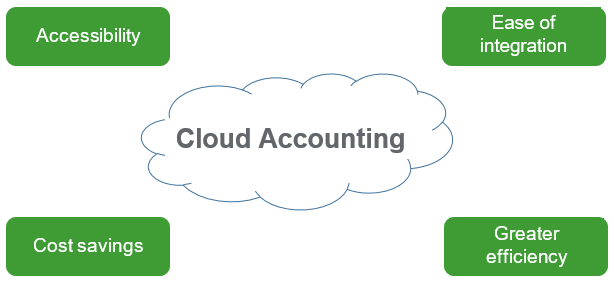Disruptive technologies have changed the game for various industries and accounting is no exception. As businesses take accounting to the cloud, a fresh approach is required for the age-old practice of bookkeeping.
Introduction
Cloud accounting, or the use of accounting software hosted on remote servers, could potentially revolutionise the way businesses perform their accounting activities, with benefits ranging from accessibility to greater productivity. Over the next five years, the global cloud accounting software market is expected to grow from US$2.63 billion in 2019 to US$4.32 billion by 2024 in terms of revenue1.
Cloud accounting offers businesses several key benefits as shown below.

Accessibility
Users can perform accounting activities, such as posting accounting entries, bookkeeping and invoicing, anytime, anywhere using any internet-enabled device. Business owners or users across different departments or offices can also retrieve accurate and timely financial information to make more informed business decisions.
Cost savings
Cloud accounting adopts a subscription-based pricing model where users basically pay for what they use and incur lower overhead expenses. This could be good news for small and medium enterprises as it does not require upfront investments in server infrastructure and IT staff to maintain and update the accounting system. These are handled by the solution provider instead.
Ease of integration
Most cloud accounting vendors give users the option to integrate third-party solutions or applications, such as inventory management, payroll management or point-of-sale systems, to complement the accounting software and streamline business processes.
Greater efficiency
Cloud accounting can increase the efficiency of accounting processes by automating or simplifying routine tasks. For example, some cloud accounting vendors provide intelligent solutions for tasks such as bank reconciliation and automatic account coding based on users’ accounting entry descriptions.
Considerations when choosing cloud accounting solutions
Cloud accounting is not the elixir for all accounting problems; it has its shortcomings. You do not want a situation where your organisation becomes overly reliant on a solution with a weak security or recovery plan that could result in serious disruptions to your business. It is therefore important to choose a reputable vendor with a good track record and to review its security policy as well as disaster recovery and readiness plan for cybersecurity incidents and power failure.
As cloud solution providers typically have a large dedicated security team to address the fundamental issue of safeguarding customer data, cloud accounting might be a more secure option than its on-premises counterpart. Cloud accounting leaves no trace of data in any computing devices and the vendor might have several backups in multiple locations. With your data stored on the cloud, the risk of data being compromised, stolen or lost is greatly reduced. Furthermore, choosing a vendor that complies with an internationally recognised professional security standard, such as ISO/IEC 27001, will also give greater assurance of its security capabilities.
Ever evolving technological development gives rise to innovative solutions that can change how the world works. Likewise, cloud accounting solutions can potentially change how businesses handle their accounting tasks. As mentioned, businesses that adopt cloud accounting solutions can potentially achieve cost savings, greater security and more efficient accounting processes, as well as enjoy easier accessibility. While the option to integrate additional third-party solutions offers the opportunity to streamline business processes, it also often comes with additional costs. It is therefore crucial for organisations to understand their real business needs and business growth strategies before deciding on a solution provider with the appropriate subscription plan and whether there is a need for third-party integration.
This article was written by Data Analytics Associate Benjamin Lye of our Technology, Media & Telecommunications practice.
1Analytical Research Cognizance, Global Cloud Accounting Software Market Growth (Status and Outlook) 2019-2024 (2019)



